Genichiro Tenryu – The Departure
Something a little different here with Genichiro Tenryu leaving All Japan in April 1990 to form a new promotion; Super World of Sports. But why? How?
To really understand Tenryu’s decision making we have to go back to when he was a sumo wrestler. When his stablemaster died he decided to find a new stable and was barred from doing so by the Japan Sumo Association. When he learned he had to deal with a new boss in his existing stable, he simply quit sumo. For Tenryu it really was that straightforward. If you’re not happy, quit. Go somewhere else.
Tenryu debuted for All Japan in 1977 but found himself very slowly being introduced to the world of pro wrestling. Baba famously had an idea of how to get people over and it involved the grind. Tenryu didn’t get many high profile matches until 1981, despite his obvious ability*. Alongside Jumbo Tsuruta he found himself tasked with being the junior man to battle incoming foreigners and often got pinned.
*A contrast to Koji Kitao, who just debuted in NJPW to huge fanfare despite being the drizzling shits.
This changed in the mid 80s when Riki Choshu invaded from New Japan. The matches between the two, even the tags, were heated affairs and raised Tenryu’s profile significantly. The slow burn push continued after Choshu’s departure, but Tenryu’s attitude had changed. Now he bullied almost anyone from Japan and only played the underdog babyface when facing someone like Stan Hansen, who was a key cog in Tenryu’s improvement.
Tenryu proved his worth to Hansen, and they began to team. While he wasn’t out of Hansen’s shadow, he was finally out of Tsuruta’s and this led to a series of matches between Tenryu and Jumbo, culminating in Tenryu winning the Triple Crown from Tsuruta in 1989. Tenryu’s 1989 was astonishing, and he even pinned Giant Baba. A rarity in All Japan where only the ‘chosen one’ was allowed to beat him.
The frustrations of Tenryu continued though as he lost the Triple Crown back to Jumbo in relatively speedy fashion and it felt like he remained a second-class citizen in his own world. In 1990 the opportunity arose for Tenryu to be the star in a promotion. Megane Super, an eyeglasses company in Japan, started Super World of Sports and their ace was to be Tenryu. Hachiro Tanaka, from Megane Super, turned Japanese wrestling upside down almost overnight.
The newly formed company poached wrestlers from the upper tiers of All Japan and New Japan in creating a new brand. The promotion would effectively wreck most of the careers of the guys who went there but the lineup was impressive at first. Aside from Tenryu, their biggest signing was taking Koji Kitao, the massively hyped former sumo wrestler, who had debuted second top at New Japan’s dome show that year.
They also poached away Yoshiaki Yatsu and Great Kabuki from All Japan’s upper tiers and George Takano and Naoki Sano were stolen from NJPW’s junior division. Samson Fuyuki was brought in, breaking up Footloose. Isao Takagi, the great underdog challenger to Tenryu from earlier in the year, was also added. For a start up promotion the roster was great.
So, why did Tenryu choose to jump? There is a suggestion that he felt disrespected at Baba’s booking. Whenever Tenryu looked like he was about to become ‘the guy’ in AJPW, he got walloped by Jumbo, or Hansen. Maybe Baba’s long term booking would have seen him on top more, but we’ll never know. His Triple Crown run does feel strangely short lived.
There’s also Tenryu’s age. He turned 40 in 1990 and clearly felt his best days in the ring were behind him. In modern terms, 40 isn’t that old, but in 1990 most 40 year olds were considering retirement. The money was also a big reason for his decision. He was offered $650,000 a year to be SWS’s main man. In modern terms that’s $1.5M. Super Megane seemed to have all the answers to his worries in the form of Big Yen.
With his position in All Japan uncertain and Tenryu looking to cash in on his existing fame, the move feels like a no brainer. Although, with the benefit of hindsight, perhaps it shouldn’t have happened. Super World of Sports has been consigned to the rubbish bin of wrestling history. Nobody really remembers them. Their big ideas and huge investment didn’t go anywhere. Tenryu would have more joy forming his own promotion; WAR, after the collapse of SWS.
During this flashback run, I’ve developed a new love for Tenryu. I always disliked him for little things that make no real sense in retrospect. I adored All Japan and considered his defection to be the work of a traitor. But without his departure, the trigger may never have been pulled on Misawa and the Four Pillars Era may have never panned out that way. I also hated his Enzuigiri (and still do) but his all-around work is way better than I ever gave him credit for and that match with Jumbo from 1989 is THE TITS. So, we go again, one final time. This is Tenryu’s final All Japan match (until NOAH happens).
If you want a more detailed look at Tenryu’s career, please read the Rich Kraetsch article on Voices of Wrestling, which he posted in 2015 when Tenryu had his retirement match.
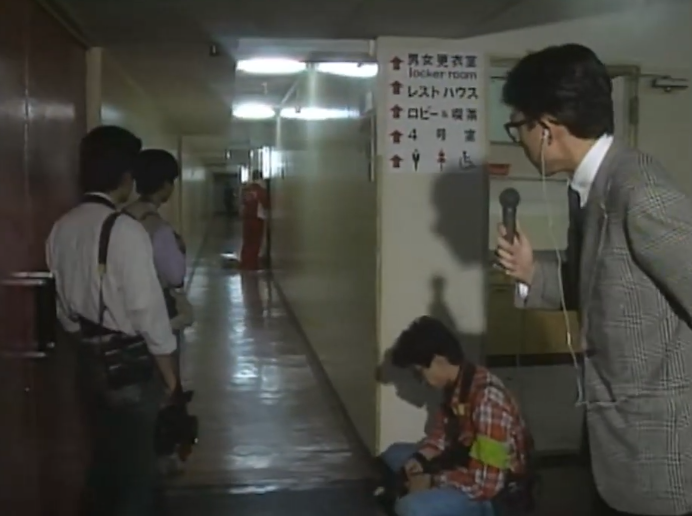
Triple Crown Championship
Jumbo Tsuruta (c) vs. Genichiro Tenryu
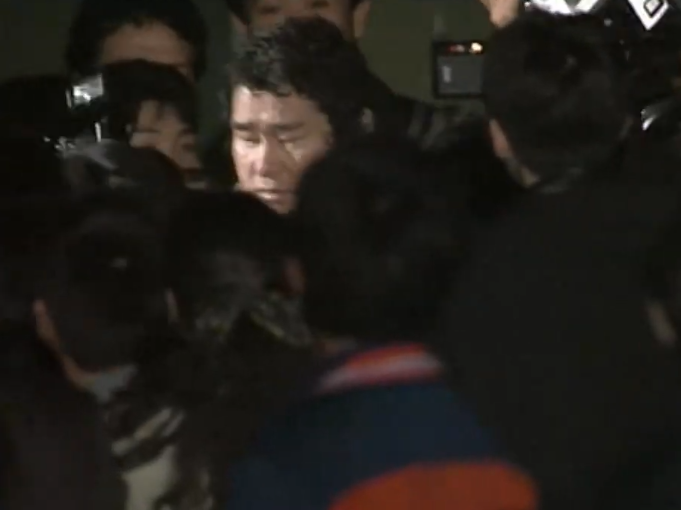
Tenryu has to literally fight his way to the ring. This is a huge deal. Not content with turning on his mate, Stan Hansen comes out here and beats the shit out of him pre-match.
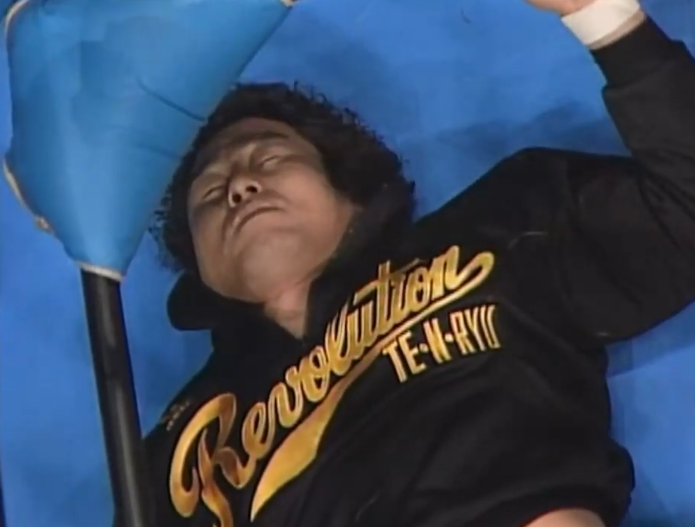
This leaves me wondering if the original plan was for Tenryu-Hansen to be Tenryu’s last match and it just never happened?
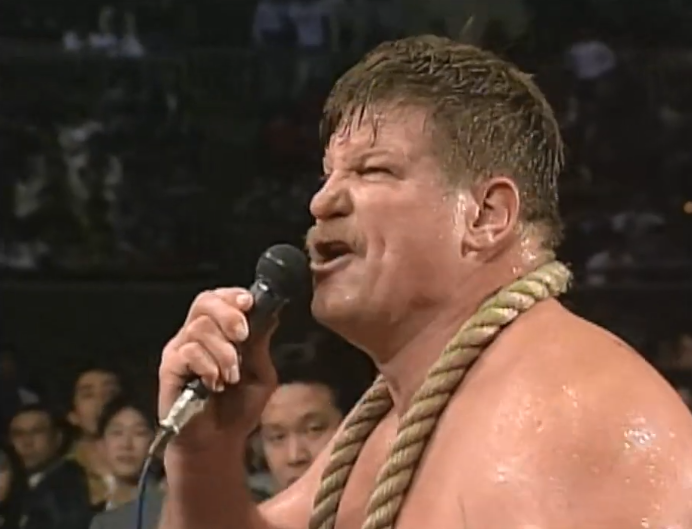
Anyway, Stan grabs the mic and tells Jumbo “it’s me and you, never mind him, it’s me and you”. That settles it then. Hansen’s assault is designed to be dismissive of Tenryu. Oddly enough, it would be Terry Gordy, not Stan Hansen, who took the belt off Tsuruta. Back in the match Jumbo goes to check on Tenryu and HE CHOPS HIM. Haha. Classic Tenryu. The fans, upset at the lack of formal introduction, toss streamers into the ring and they start wailing on each other.
Tenryu does a great job of selling Hansen’s pre-match assault so when Jumbo lariats him, he’s right back in that selling zone. This feels like a Wrestlemania match, in that they both go to big moves straight away and then fight over big moves. Certain people earn those matches through years of hard work. These guys have definitely earned the chance to finish the rivalry with an epic.
The trouble lies with the setup of the match. With having Tenryu weakened pre-match leaves him fighting from underneath and it lessens Jumbo’s levels of motivation. The fire and fury of Tsuruta when they faced each other last year isn’t all here. I would be fine with all this if it wasn’t for Jumbo’s selling. When Tenryu finally gets something going, Tsuruta starts selling like crazy. Making it feel like Tenryu has a chance, but he doesn’t. That’s the whole storyline of the match.
Sometimes it’s ok to cheer for someone who is going to lose.
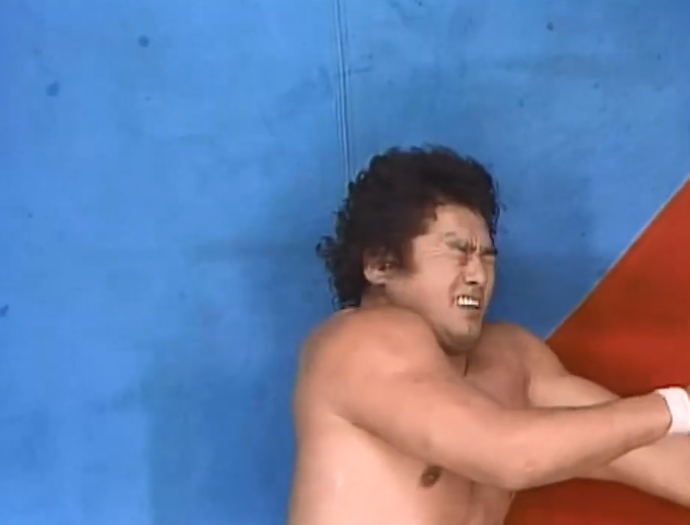
One of wrestling’s bigger faults is this sense of fairy tale storytelling. It’s still the case now. Sometimes your story is that one guy is going to win. A better approach is having Tenryu, all guts, no glory, kick out of Jumbo’s big moves. That’s where they end up anyway. With gutsy kick outs and desperation flash pins before eventually succumbing to the Backdrop Hold and off Tenryu goes. Riding into the sunset. Despite the flaws this is a fitting conclusion to a wonderful feud. ***¾
And that’s it. Tenryu’s next All Japan match is in 2000 after Mitsuharu Misawa’s entire AJPW career has finished. He literally moved out of the way for Misawa to be the top guy. Albeit compensated to the tune of $650,000 in the process. To give a comparison with an (overpaid) American wrestler at the same time Tom Zenk was on $300,000 a year for WCW.
Ah, WCW. We’ll be balls deep in that sloppy mess again soon enough. The next ‘tape’ review is the Robocop show.
 Twitter
Twitter